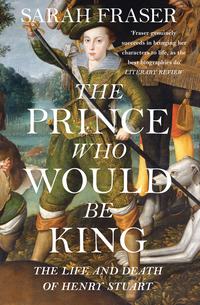
The Prince Who Would Be King: The Life and Death of Henry Stuart
Henry soon wanted his own shipwright, and swore Phineas Pett, builder of the Disdain, into his service. Corrupt in his handling of naval supplies, like so many royal naval personnel, few thought that Pett would stop his extensive appropriation of building materials for his private use now he entered royal service, especially now he had far greater scope to abuse his privileges.
In the summer of 1604, Henry sailed downriver from Nonsuch for the most important European event of the year: the signing of the Treaty of London. On 28 August, England and Spain finally agreed peace terms after nearly two decades of warfare. The Spanish had tried to make it a condition of the peace that James withdrew his support from the rebel Dutch. James refused. England still saw itself as a mainstay in European Protestantism.
The Spanish delegation and the royal family attended a special service in the royal chapel at Whitehall. ‘The altar was covered in silver gilt and on it stood the Gospels in English’ – not Latin, the vernacular Bible being the bedrock of Protestantism. ‘After some hymns in praise of peace had been chanted’ – again in English – ‘Secretary Cecil handed a copy of the treaty to the Constable and read aloud the oath by which both the King and Prince bound themselves to the observation of the terms … the King and Prince meanwhile laying their hands on the Gospels.’
Death so often mocked the best intentions in a second of haemorrhage, clot, or bacterial invasion. Spain needed to look beyond James and know the future Henry IX bound himself to honour this peace. The Constable of Castile, chief Spanish negotiator, asked for an audience with the prince. Henry consented.
First the prince danced for him, then he took the constable down into the gardens of St James’s Palace. There he practised at push of pike and rode for him, giving the constable a first feel for what problems or possibilities England might breed up in the years to come. Henry was precociously poised, ‘with a most gracious smile’ but ‘a terrible frown’. His staff thought their prince never ‘tossed his pike better than in presence of his Majesty and great Ambassadors’. The constable gave Henry a beautifully caparisoned pony, and advised Madrid to keep open nascent negotiations for a marriage contract between Prince Henry and the Spanish infanta. If nothing else, it would make Anglo-French and Anglo-Dutch relations less cordial. Both of those countries were already irritated by the peace agreement.
At the feast to celebrate the treaty, Spain and England proposed toasts and exchanged gifts so excessive the Venetian ambassador felt ill at the scale of it all. ‘Taxis [a Spanish minister] is making presents every day and one hears of nothing else just now,’ Niccolo Molino complained. ‘It is said that he has spent upwards of two hundred thousand crowns in jewels, and that money has been given as well. The Spaniards are lauded to the skies; for in fact this is a country where only those that are lavish are held in account,’ he said. ‘Since my arrival in this court ten months ago, I have heard of nothing so often as presents.’ The bribe and bonus culture thrived in a glut of sweeteners. ‘Great nobles and members of the Privy Council make [no] … scruple about accepting them, and scoff at those who hold a different view.’ Only fools entered politics without believing it would make their fortune. Public service and self-service walked hand in hand. James returned the extravagant gift-giving. Power had to be seen to be power.
ELEVEN
Union and Disunion
‘BLOW YOU SCOTCH BEGGARS BACK TO YOUR NATIVE MOUNTAINS’
By the beginning of November 1605, the whole royal family, bar Elizabeth, came together in London for the state opening of the next session of Parliament. Taken as a family the Stuarts had proved to be an act more than able to step into Elizabeth I’s shoes – which partly accounted for Catesby, Throckmorton, Fawkes and their discontented Catholic friends’ decision to kill them all, except the girl. The rest dead, they could forcibly convert Princess Elizabeth to Catholicism, set her up as a puppet, and offer her to a Catholic prince. With most MPs and Lords also dead, they could establish a Catholic-dominated Parliament.
The opening of Parliament was scheduled for 6 November 1605. The day before, acting on a tip-off, a search party revealed Guy Fawkes in a cellar under the great hall at Westminster nursing thirty-six barrels of gunpowder.
Prince Henry and his parents were ‘a dangerous disease’, Fawkes said. It required ‘a desperate remedy’ to ‘blow you Scotch beggars back to your native mountains’. King James had betrayed them. In Scotland he let them believe he would ease the penal laws against Catholicism when he succeeded to the throne of England. He had not done it. Racist anti-Unionism overlapped with religious loathing.
Конец ознакомительного фрагмента.
Текст предоставлен ООО «ЛитРес».
Прочитайте эту книгу целиком, купив полную легальную версию на ЛитРес.
Безопасно оплатить книгу можно банковской картой Visa, MasterCard, Maestro, со счета мобильного телефона, с платежного терминала, в салоне МТС или Связной, через PayPal, WebMoney, Яндекс.Деньги, QIWI Кошелек, бонусными картами или другим удобным Вам способом.
Вы ознакомились с фрагментом книги.
Для бесплатного чтения открыта только часть текста.
Приобретайте полный текст книги у нашего партнера:
Всего 10 форматов